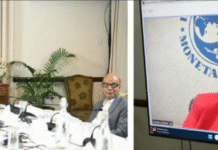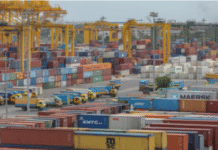
“The economic growth may see 0.5 to 0.6 percentage point fall this fiscal due to the recent political instability,” said the former Finance Adviser to the caretaker government.
Mirza Azizul Islam was speaking at the launch of ‘ESCAP Economic and Social Survey for Asia and the Pacific, 2013’ at IDB Bhaban auditorium in the city’s Agargaon area.
He said that there is no doubt that political instability put an adverse impact on the country’s export, production and thus GDP growth.
About the GDP growth projection of current fiscal, Mirza Aziz said obviously the growth would be less than 6 percent in this year. “The inflation target was 7.5 percent in this year and I think it would be still slightly higher, but not may be very much higher, probably 8 to 8.1 percent,”
Bangladesh achieved 6.7 percent economic growth in 2010-11 fiscal and 6.3 percent in 2011-12 fiscal, and the government has targeted 7.2 percent in 2012-13 fiscal.
The former adviser also stressed the need for additional public investment in health, education, social safety net and infrastructure sectors.
Mirza Aziz said he had been always speaking that Bangladesh should be ashamed of its revenue generation performance. “Our revenue-GDP ratio is the lowest in the South Asia, and lower than even Nepal although per capita income of the Himalayan country is two third of ours.”
Underscoring the need for raising the revenue-GDP ratio, Aziz said he does not think that Bangladesh should really think of raising the tax rates or the number of slabs in terms of income and corporate taxes. Rather, the country should expand the coverage of the indirect taxes, as it has a scope of further enhancement.
“We should take firm action against any evasion which will expand the geographical coverage and we should expand the geographical coverage. We have to strengthen revenue administration so that we can collect more taxes,”
He said the growing rural-urban divide in terms of quality of education should be addressed properly. The quality expenditure of public health should also bring under scanner.
The former adviser noted that in the last few years the spending for the social safety net schemes have been reduced to 15 percent from the highest ever allocation of 17 percent in 2008-09.
He said Bangladesh needs to pay a greater attention to the administration of the system, as the country has too many social safety net projects.
“So, there’s a scope for merger or consolidation, and better coordination among. Secondly, any leakages from the system must be stopped.”
Noting that Bangladesh is in the right direction, Mirza Aziz, also a visiting Professor at BRAC Business School, said that in some areas there is a need for scaling up alongside proper administration of various social safety net projects.
Mentioning that Bangladesh is still a country of low-income inequality compared to many other countries, he said, “We need growth, reduce inequality and need to enhance poverty alleviation.”









